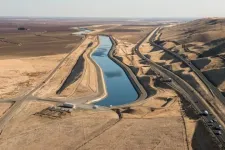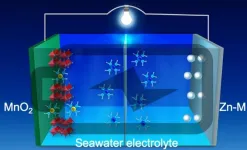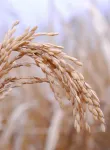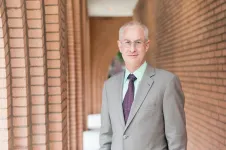(Press-News.org) As the planet continues to warm, the twin challenges of diminishing water supply and growing energy demand are intensifying. But because water and energy are inextricably linked, as we try to adapt to one challenge - say, by getting more water via desalination or water recycling - we may be worsening the other challenge by choosing energy-intensive processes.
So, in adapting to the consequences of climate change, how can we be sure that we aren't making problems worse?
Now, researchers at the Department of Energy's Lawrence Berkeley National Laboratory (Berkeley Lab), UC Berkeley, and UC Santa Barbara have developed a science-based analytic framework to evaluate such complex connections between water and energy, and options for adaptations in response to an evolving climate. Their study, "Evaluating cross-sectoral impacts of climate change and adaptations on the energy-water nexus: A framework and California case study," was published recently in the open-access journal Environmental Research Letters.
"There have been many analyses on how climate change could affect the water and energy sectors separately, but those studies were not typically looking at interactions and feedbacks between the two," said lead author Julia Szinai of Berkeley Lab's Climate and Ecosystem Sciences Division. "Our paper develops a generalized framework that identifies how climate change affects these coupled water and electricity systems, and potential adaptations to future gaps in supply and demand. By doing so, we illustrate often-overlooked tradeoffs and synergies in adapting to climate change."
"In developing this project, Julia led a remarkable effort to integrate the climate impacts and feedbacks between the energy and water sectors," said co-author Daniel Kammen, a professor of energy and resources at UC Berkeley. "What is critical to planning our future under climate change is to capture - in both simplified and full dynamical models ¬- how interdependent are our infrastructure choices."
In applying the framework they developed to California, which relies on the snowpack for a good deal of its water and expends significant amounts of energy to transport water from the northern to the southern part of the state, they found that there are two possible adaptation pathways: one that is energy intensive and one that can actually save both water and energy.
"One of the most important points of the paper is that adapting our water system to climate change can either significantly exacerbate electricity grid stress, or on the flip side, it could help to alleviate it," said co-author and Berkeley Lab climate scientist Andrew Jones. "If we focus on adapting the water system by using big transfers of water across basins, or by using energy-intensive desalination, that's just going to make the electricity problem much more difficult. If, on the other hand, we adapt the water system by conserving water, it's actually a win-win situation because you're also reducing the energy required for water."
Currently, a staggering 19% of California's electricity consumption goes toward water-related applications, such as treating it, transporting it, pumping it, and heating it. Additionally, about 15% of in-state electricity generation comes from hydropower. Such interdependencies are referred to as the water-energy nexus. The state has already seen some impacts that climate change could have on these highly interdependent water-energy systems; for example, extended droughts and reduced snowpack have resulted in spikes in electricity consumption from groundwater pumping and hydropower deficits, which were made up by generating electricity using dirtier fossil fuels.
Looking ahead, the researchers integrated data across a number of fragmented studies to estimate the overall range of possible water and energy futures under various climate scenarios for the state at the end of the century. Their analysis found that the greatest direct climate change impact on the electricity sector in California will likely come from two factors: higher air conditioning loads and decreased hydropower availability. In the water sector, the greatest and most uncertain impact of climate change is on future water supplies. In the worst case, available water supplies could decrease 25%, and in the best case could increase 46%.
Applying their framework to California's water-energy future, they found that, if the state were to adapt to the worst-case water scenario by choosing the most energy-intensive technologies, it could result in an energy imbalance as large as that caused by climate change itself (increased air conditioning use and decreased hydropower availability being the climate change factors having the greatest direct energy imbalance impact).
"I think this is the first study to show that water sector adaptation can have as large of an impact on the electricity sector as the direct effect of climate change itself," said Jones. "So, if we pursued the energy-intensive path to water sector adaptation then it is as large as the direct effect of climate change, in the worst case."
Co-author Ranjit Deshmukh, a professor of environmental studies at UC Santa Barbara and faculty scientist at Berkeley Lab, noted, "Going forward, the electricity sector could leverage its close coupling with the water sector to enable balancing of increasing wind and solar generation in California as the state strives to meet its low-carbon-emission goals. For example, energy-intensive equipment such as water pumps or desalination plants, with adequate water storage, could be operated during times of plentiful solar and wind energy, and turned off at other times."
Next, Szinai, a UC Berkeley graduate student, said she plans to develop detailed models of both water and electricity systems so researchers can run simulations under various climate change and climate change adaptation scenarios, ultimately aiding planners in building out both the electrical grid and water resources.
"This study has highlighted the benefit of coordinated adaptation planning between the two sectors, so we're now linking a more detailed water resources management model and an electricity planning model that can demonstrate resilient pathways for building out electricity infrastructure in the Western U.S. when climate change impacts are included from the water sector," she said.
INFORMATION:
This study was supported by the DOE Office of Science and the National Science Foundation. It is part of DOE's HyperFACETS project.
Founded in 1931 on the belief that the biggest scientific challenges are best addressed by teams, Lawrence Berkeley National Laboratory and its scientists have been recognized with 14 Nobel Prizes. Today, Berkeley Lab researchers develop sustainable energy and environmental solutions, create useful new materials, advance the frontiers of computing, and probe the mysteries of life, matter, and the universe. Scientists from around the world rely on the Lab's facilities for their own discovery science. Berkeley Lab is a multiprogram national laboratory, managed by the University of California for the U.S. Department of Energy's Office of Science.
DOE's Office of Science is the single largest supporter of basic research in the physical sciences in the United States, and is working to address some of the most pressing challenges of our time. For more information, please visit energy.gov/science.
CORVALLIS, Ore. - Researchers in the Oregon State University College of Engineering have developed a battery anode based on a new nanostructured alloy that could revolutionize the way energy storage devices are designed and manufactured.
The zinc- and manganese-based alloy further opens the door to replacing solvents commonly used in battery electrolytes with something much safer and inexpensive, as well as abundant: seawater.
Findings were published today in Nature Communications.
"The world's energy needs are increasing, but the development of next-generation electrochemical energy storage systems with high energy density and long cycling life ...
PULLMAN, Wash. - Biomarkers in human sperm have been identified that can indicate a propensity to father children with autism spectrum disorder. These biomarkers are epigenetic, meaning they involve changes to molecular factors that regulate genome activity such as gene expression independent of DNA sequence, and can be passed down to future generations.
In a study published in the journal Clinical Epigenetics on Jan. 7, researchers identified a set of genomic features, called DNA methylation regions, in sperm samples from men who were known to have autistic children. Then in a set of blind tests, the researchers were able to use the presence of these features to determine whether other men had fathered autistic children with 90% ...
New research shows people who pursue meaningful activities - things they enjoy doing - during lockdown feel more satisfied than those who simply keep themselves busy.
The study, published in PLOS ONE, shows you're better off doing what you love and adapting it to suit social distancing, like swapping your regular morning walk with friends for a zoom exercise session.
Simply increasing your level of activity by doing mindless busywork will leave you unsettled and unsatisfied.
Co-lead researcher Dr Lauren Saling from RMIT University in Melbourne, Australia said while novelty lockdown activities - like baking or painting - have their place, trying to continue what you enjoyed before lockdown can be more rewarding.
"Busyness might be distracting but it won't necessarily be fulfilling," ...
COVID-19 infections are once again rising at an alarming rate in San Francisco's Latinx community, predominantly among low-income essential workers, according to results of a massive community-based testing blitz conducted before and after the Thanksgiving holiday by Unidos En Salud -- a volunteer-led partnership between the Latino Task Force for COVID-19 (LTF), UC San Francisco , the Chan Zuckerberg Biohub (CZ Biohub), and the San Francisco Department of Public Health (SFDPH).
Unidos En Salud launched their "Healthy Holidays" initiative the weekend before Thanksgiving (Nov. 22-24) in San Francisco's Mission District, where they have been perfecting their community-based surveillance testing ...
The genetic material of plants, animals and humans is well protected in the nucleus of each cell and stores all the information that forms an organism. For example, information about the size or color of flowers, hair or fur is predefined here. In addition, cells contain small organelles that contain their own genetic material. These include chloroplasts in plants, which play a key role in photosynthesis, and mitochondria, which are found in all living organisms and represent the power plants of every cell. But is the genetic material actually permanently stored within one cell? No! As so far known, the genetic material can migrate from cell to cell and thus even be exchanged between different organisms. Researchers at the Max Planck Institute of Molecular Plant Physiology (MPI-MP) ...
We are fascinated by machines that can control cars, compose symphonies, or defeat people at chess, Go, or Jeopardy! While more progress is being made all the time in Artificial Intelligence (AI), some scientists and philosophers warn of the dangers of an uncontrollable superintelligent AI. Using theoretical calculations, an international team of researchers, including scientists from the Center for Humans and Machines at the Max Planck Institute for Human Development, shows that it would not be possible to control a superintelligent AI. The study was published in the Journal of Artificial Intelligence Research.
Suppose someone ...
When an accident occurs, the reactions of bystanders are important. Researchers have studied whether laypeople realise the severity of the situation when someone in their proximity begins to bleed, and whether they can estimate how much the person is bleeding. The results show a discrepancy related to the victim's gender: for a woman losing blood, both blood loss and life-threatening injuries were underestimated. The study has been published in the scientific journal PLoS One.
Researchers from Linköping University and Old Dominion University in the United States wanted to study the ability of laypeople to visually assess blood loss, and what influences them when judging the severity of an injury.
"Laypeople's ...
Recent years have provided substantial research displaying the effect of genetic mu-tations on the development of autism and other neurodevelopmental disorders. Based on those studies, researchers have focused attention on the commonalities be-hind those mutations and how they impact on the functioning of the brain. A study conducted by Professor Sagiv Shifman from the Life Sciences Institute at the He-brew University of Jerusalem and the Center for Autism Research has found that genes associated with autism tend to be involved in the regulation of other genes and to operate preferentially in three areas of the brain; the cortex, the striatum, and the cerebellum.
The cerebellum ...
Rice is the staple food of about half the world's population. The cultivation of the rice plant is very water-intensive and, according to the German aid organization Welthungerhilfe, around 15 per cent of rice is grown in areas with a high risk of drought. Global warming is therefore becoming increasingly problematic for rice cultivation, leading more and more often to small harvests and hunger crises. Crop failures caused by plant pathogens further aggravate the situation. Here, conventional agriculture is trying to counteract this with pesticides, which are mostly used as a precautionary measure in rice cultivation. The breeding of resistant plants is the only alternative to these environmentally harmful ...
Seeking to understand why COVID-19 is able to suppress the body's immune response, new research from the USC Leonard Davis School of Gerontology suggests that mitochondria are one of the first lines of defense against COVID-19 and identifies key differences in how SARS-CoV-2, the virus that causes COVID-19, interacts with mitochondrial genes when compared to other viruses.
These differences offer possible explanations as to why older adults and people with metabolic dysfunction have more severe responses to COVID-19 than other individuals, and they also provide a starting point for more targeted experiments that may help identify therapeutics, said senior author Pinchas Cohen, professor of gerontology, ...





